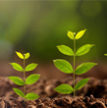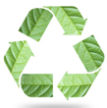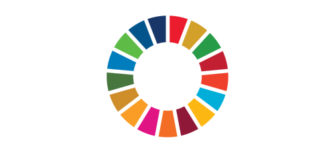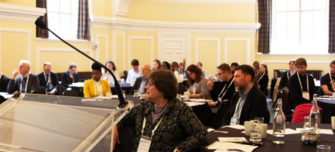75th Anniversary: A Sustainable Future
The role of microbiology in achieving the United Nations Sustainable Development Goals

Background
Microbiologists are involved in addressing challenges that vary from urgent problems demanding immediate solutions - such as new and emerging diseases - through to long-term issues like antimicrobial drug resistance, food security, and environmental sustainability. To mark the 75th anniversary of the Microbiology Society, we embarked on an ambitious project that demonstrates the value and raised the profile of microbiology in addressing the world’s biggest challenges. Specifically, we are focusing on how microbiology can help to achieve the United Nations Sustainable Development Goals (UN SDGs).
The SDGs are a collection of 17 goals and 169 associated targets adopted by all Member States of the UN in September 2015. Wide-ranging and ambitious, the goals are a blueprint for transforming our world by 2030. They are interconnected and address economic, social and environmental challenges crucial to a better and more sustainable future for all.
Areas of interest
Microbiology can contribute to achieving the UN SDGs in many ways. Given the breadth of the discipline of microbiology, it can play a role in accomplishing almost all of the 17 Goals.
However, while the broader role of microbiology is still taken into consideration, the ‘A Sustainable Future’ project focused on three project streams where the contribution of microbiology is particularly significant and relevant. These included antimicrobial resistance, which has been described as one of the biggest threats to humanity; the circular economy, a system which aims to maximise the efficient use of the world’s finite resources; and soil health which is essential to feed our growing population.
-
A Sustainable Future: Project Statement
Bringing together Microbiology Society members and other stakeholders, the ‘A Sustainable Future’ project reflected on the greatest threats facing future generations and focused on unlocking the potential of microbiology to achieve the UN SDGs.
-
Soil Health
The importance of maintaining the health of our soils has gained increasing prominence in recent years. Soils are essential for the global food system and regulate water, carbon and nitrogen cycles but are put under pressure from population growth and climate change.
-
Antimicrobial resistance (AMR)
The threat of antimicrobial resistance (AMR) has now been recognised globally and it is estimated that 10 million people a year will die due to antimicrobial resistance by 2050 if no urgent action is taken.
-
Circular Economy
A circular economy is an alternative to a traditional linear economy (make, use, dispose) in which we keep resources in use for as long as possible, extract the maximum value from them while in use, then recover and regenerate products and materials at th
-
The role of microbes in climate change and recycling
Microbes play key roles in nutrient cycling, biodegradation/biodeterioration, climate change, food spoilage, the cause and control of disease, and biotechnology. We will explore why microbes play an important role in climate change, and how thanks to their versatility, microbes can be put to work in many ways.
-
The United Nations Sustainable Development Goals
View a list of the 17 United Nations Sustainable Development Goals (UN SDGs). The goals are a blueprint for transforming our world by 2030.
-
A Sustainable Future Policy Project Launch Event Summary
On Thursday 2 May 2019, the Microbiology Society hosted the Launch Event of its policy project 'A Sustainable Future': The role of microbiology in achieving the United Nations (UN) Sustainable Development Goals (SDGs) at Central Hall, Westminster.
-
A Sustainable Future activity feed
Explore our 'A Sustainable Future' activity feed, featuring interviews with members, podcasts and updates on how microbiologists are striving to help achieve a sustainable future.
-
'A Sustainable Future' Journal Collection
To highlight the vital role our members play in delivering on the UN Sustainable Development Goals, we have created a collection of must-read articles.
Image credits:
Sofiaworld/iStock
Digicomphoto/iStock
Chinnapong/iStock
Amy Apprill
www.un.org/sustainabledevelopment
Krungchingpixs/iStock
piyaset/iStock
Opico//iStock
Dennis Kunkel/SPL
Steve Gschmeissner/Science Photo Library
Steve Gschmeissner/Science Photo Library











